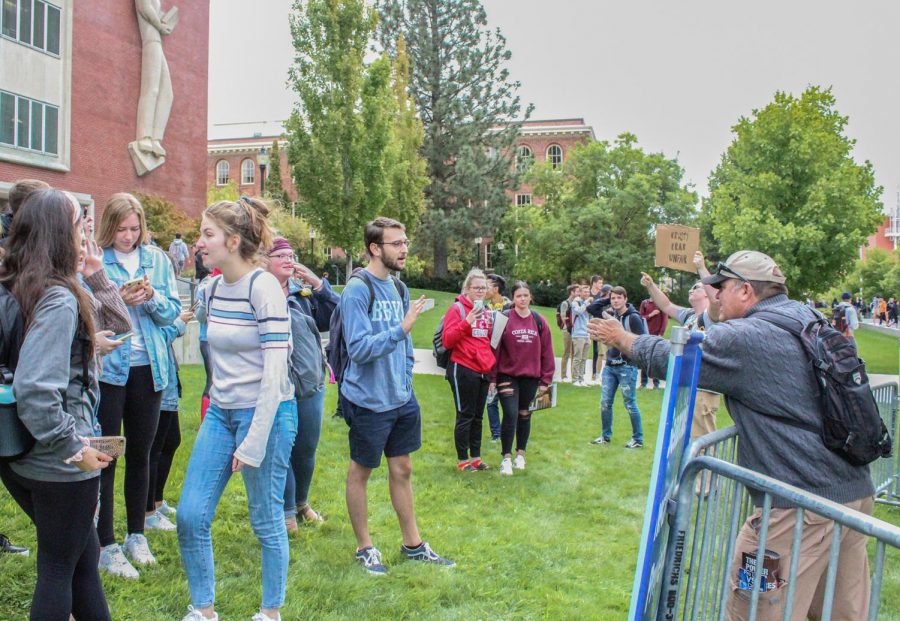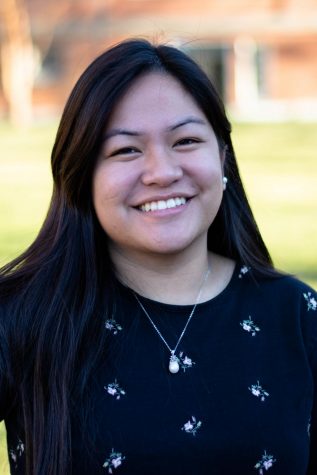Students raise concerns over transparency
Neighboring campus sent email warning about demonstration
CAROLYNN CLAREY | DAILY EVERGREEN FILE
WSU students speak to anti-abortion demonstrators Sept. 16 in front of Bryan Hall. The demonstrators sent a letter to WSU stating they would sue the university if needed.
October 7, 2019
Many students have expressed frustration that they were never warned about a graphic anti-abortion demonstration that appeared on Sept. 16, despite the fact that administration and ASWSU knew it would happen two weeks in advance.
ASWSU President Quinton Berkompas said a letter from the demonstration group, The Center for Bio-Ethical Reform, outlined that it would sue the university if it restricted the group’s First Amendment rights.
Phil Weiler, WSU vice president for marketing and communications, said WSU must protect free speech rights regardless of the content.
The university follows the Washington Administrative Code Chapter 504-33, which outlines the rules groups must follow before exercising free speech activities on campus.
Weiler said there was a “struggle” in terms of sending a campus-wide email because some people might perceive it as the university trying to limit the group’s ability to communicate with the public.
Prior to the event, the university placed signs around the demonstration to indicate that there would be a free speech event nearby, he said, which is different than sending an email to avoid the area.
“There are those individuals in society that take advantage of free speech rights to make people feel uncomfortable,” Weiler said. “That’s terrible, but it’s not illegal.”
Aside from enforcing the First Amendment, WSU also has to ensure that free speech activities will not disrupt the learning and research environment on campus, according to the website.
Grace Lim, Asian Pacific American Student Coalition vice chair, said there were images that referred to historical events, such as the Holocaust and lynchings, which impacted more than just one population of students.
“It was a whole mental ball, like a hit that most students were not prepared about,” Lim said.
Students should have received a campus-wide email to notify them about the demonstration, she said, especially because the group has a history of doing displays like this on other colleges.
Jodi Walker, University of Idaho director of communications, said they sent a campus-wide email to UI students, faculty and staff a day before the same demonstration occurred on their campus.
Walker said it was not the first time they notified the entire campus about an event like this, and that the intent was not to make people lean on one side or the other.
“We want to be able to provide that space, but we also wanted people to be aware,” she said.
UI reached out to other universities who had the same anti-abortion group on campus, Walker said. UI asked them what they wish they had done to serve their campus better. The university heard repeatedly that it would have been less disruptive if they notified the community prior to the demonstration.
Berkompas said they chose not to send a campus-wide email to avoid adding fuel to the fire.
“This wasn’t about First Amendment rights versus protecting students,” he said. “Those First Amendment rights are always going to stand still whether we want them to or not.”
A week after the demonstration, Berkompas said ASWSU hosted a “Week of Kindness” to retake the area where the demonstration took place and reestablish the culture WSU had before.
“The amount of mental and emotional impact that that display had cannot be resolved or addressed enough through a Band-Aid called ‘Week of Kindness,’” Lim said. “It’s not going to reverse time or change students, what they already had to go through during those two full days.”
















